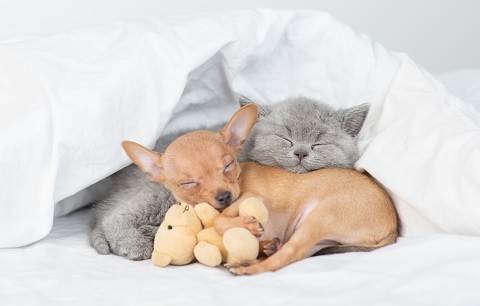Just like us, the early years of a pet’s life are some of their most important. Their bones and muscles are growing and their body is getting ready for big wide world.
Puppies and kittens need specific diets
When you’re at your vets, getting their initial checks, inoculations and micro-chipping, they’ll probably recommend feeding your new family addition dedicated puppy or kitten food.
What puppies need from their diets
When a puppy is growing they need three major things from their diet;
- Calories
- Nutrients
- Vitamins
Puppy food is high in calories and dense in nutrients. This helps to support their quickly-growing skeleton – an adult dog simply needs to maintain a healthy weight body, whereas a puppy is literally growing theirs.
What to look for in puppy food
As with human food, puppy food comes in good, better and best. Take a look at the ingredients and buy the best you can afford. Stay away from foods that use corn or other fillers instead of meat. Your puppy needs calcium and protein from meat to help its muscles and bones grow!
Ensure your chosen food contains:
- Calories, protein and fat – Dedicated puppy food has more calories than adult dog food to support their growing body. The extra calories are good, but it’s worth keeping an eye on your puppy’s weight and your food portioning. Check out our weight guide here.
- Omega fatty acid DHA – Docosahexaenoic is an important nutrient for brain and vision development.
- Vitamins and minerals, especially vitamins E and selenium – These are antioxidants that help puppies develop their immune systems. The better the immune system, the smaller the risk of illness (and expensive vet bills).
- Calcium – Calcium is important for bones and teeth. It’s also important you have the right calcium to phosphorus ratio for your puppy. You needn’t worry too much about this, most high quality puppy foods have this sorted for you.
Your vet will probably suggest a couple of brands of puppy food. We have a large range from leading brands including Royal Canin, Hills Science Plan, Lily’s Kitchen and Arden Grange. You can find our whole range of puppy foods here.
In general, you want to be opting for high quality, meat based foods. These help your puppy get the protein and calcium it needs to develop.
When to move up to “adult” foods
When your pup comes up to around 12 months, they’ll tend to move onto an adult diet/food. Some breeds move up sooner, some a little later, as it depends on their size and average life expectancy. Ask at your initial vet consultation, as to when your particular dog should move up to adult foods.
Kitten foods
As with puppies, choosing the right diet for young kittens during their development years is important – helping them to grow into the mini lions that they truly are.
What to look for in kitten food
- Extra protein – This is essential to support their growth and the development of strong muscles and supporting tissue.
- Antioxidants, including vitamin E- These help to support your kitten’s natural defences during the early stages.
- Calories – Dedicated kitten food has higher energy content (calories) to keep up with their level of activity. Sometimes neutered kittens can put on weight so there’s specific neutered/sterilised cat foods aimed at keeping their weight from creeping up.
You can buy the leading brands Royal Canin, Hills or Purina from us – usually at much cheaper prices than your vet’s, alternatively we have an extensive range of kitten food here.
Kitties turn into adult cats at around 12 months old. Once they reach that age it’s time to change their diet. Ask your vet at your annual check up, what they’d recommend.
With proper, high quality nutrition, you’re setting the ground works for your pet to have a happy and healthy long life.
Don’t forget, Animed Direct can help you with reduced cost dog flea and worm products or cat flea and worm treatments too.
Want more information about the nutritional needs of your pet throughout their life? Here’s a quick read that covers that.

